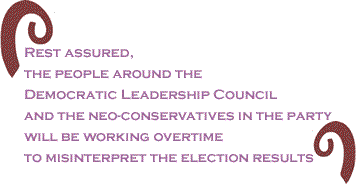
|
|||||||||||||||||||||
 |
|||||||||||||||||||||
 |
|||||||||||||||||||||
 |
|||||||||||||||||||||
 |
|
On the eve of the vote, very conservative African American commentator Star Parker, wrote, “The intensity of black negativity makes the overall dour mood of the general voting population look almost sunny.” That will explain the sour mood of most black conservatives as Tuesday neared. For Star, it reflects “black attitudes” and the extent to which African Americans “are still dreaming rather than working.” For Harry R. Jackson, Jr. the Republican hopes rested with the “handful of free thinking blacks.” Thomas Sowell laid the blame for the GOP’s problems on the media and “heaven help us if they succeed.” So much for those people; they’ve got nothing going for them. Any hope President Bush and his party had for picking up any significant support in the African American community was drowned by Katrina and swept away by the carnage in Iraq. The African American political consensus, always overwhelming, is now undeniable. The question, as a result of the election’s aftermath, is to what extent the views and aspirations of the African American community are recognized and responded to. The same can be said for the views of the progressives in the wider community who – on the ground – contributed to the Republican’s defeat. Exit polls indicate that only about 10 percent of African American voters went for Republicans – about the same as in 2004. Latinos are reported to have reduced their support for the GOP to 29 percent – down 30 percent. Asian voters wet for Republicans 37 percent – down 9 percent from two years ago. While sex scandals grabbed the headlines in the run-up to the balloting, the seismic political shift on Tuesday, more basic policy concerns - plus corruption - appear to have been uppermost in the minds of voters. A majority of voters told exit pollsters they believed the nation is going in the wrong direction and about half of voters said the state of the economy was bad. Of those who were bothered by the economy, 8 in 10 voted for the Democratic candidate.
The polls hadn’t even opened before the “centrists” began to trot out their calls for “bipartisanship” and caution about “extremes.” This means there will be strong pressures for not taking definitive action to bring the war in Iraq. Rest assured, the people around the Democratic Leadership Council and the neo-conservatives in the party will be working overtime to misinterpret the election results. However, one thing is clear: the size of the turnout – despite the apprehensions on the part of many that their votes would not be counted, makes it quite obvious that the people want a big change in the country’s direction. Whether that happens will depend to a large extent on the actions of political movements outside the halls of Congress in pressing a progressive agenda. Then, there are the calls for avoiding “revenge” and “retribution.” This means that the Congressional Democrats should avoid employing their new position to call Bush and company to tasks for the war and use their subpoena power to expose the deceptions and plots that produced the Iraq war and the full extent of the corruptions that took hold on Washington when the Bushites arrived. Changing the composition of Congress is victory for African Americans, Latinos, labor, women and all people who stand for equality and economic justice and progressive social policies. But the work of forging a progressive political majority has only just begun – albeit in a new atmosphere. Having people in key positions in the new Congress like John Conyers and Charles Rangel is a major step forward but how it all plays out will depend on how they respond to the overwhelming mandate they have from the black community for moving boldly forward.
As far as the war in Iraq is concerned, the U.S. Ambassador to Baghdad, the man from Unocal, Zalmay Khalilzad, has cautioned Iraqis to pay no attention to the election outcome, adding, “The President will be the commander-in-chief and the architect of US foreign policy regardless of its outcome.” He was only echoing what Vice-President Dick Chaney, the man from Halliburton, said a few days earlier; the Administration will stay the course regardless of the vote. The nation voted against the war in Iraq; the leadership of the winning party will either take decisive action to end it or betray the people who returned them to power. BC Editorial Board member Carl Bloice is a writer in San Francisco, a member of the National Coordinating Committee of the Committees of Correspondence for Democracy and Socialism and formerly worked for a healthcare union. Click here to contact Mr. Bloice. |
|
| Home | |
Your comments are always welcome. Visit the Contact Us page to send e-Mail or Feedback or Click here to send e-Mail to [email protected] e-Mail re-print notice
If you send us an e-Mail message we may publish all or part of it, unless you tell us it is not for publication. You may also request that we withhold your name. Thank you very much for your readership. |
|
| November 2, 2006 Issue 204 |
||||||||||||||
|
||||||||||||||
|
||||||||||||||
| Printer Friendly Version in resizeable plain text format | ||||||||||||||
 |
||||||||||||||
 |
||||||||||||||
 |
||||||||||||||
 |
||||||||||||||
| |
||||||||||||||
| |
||||||||||||||





























